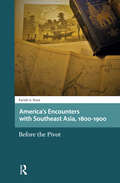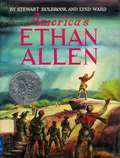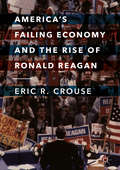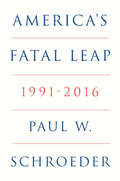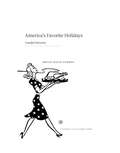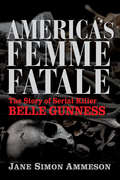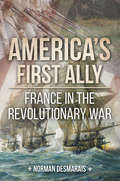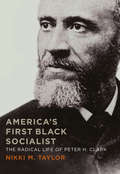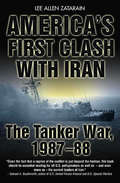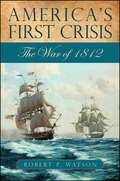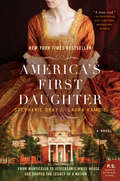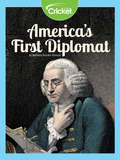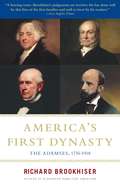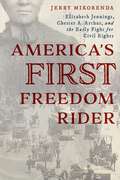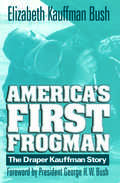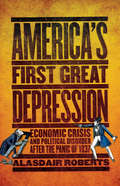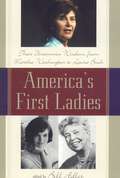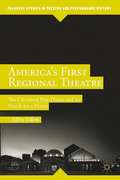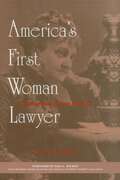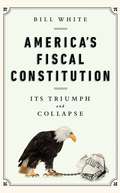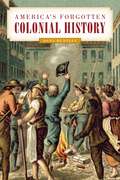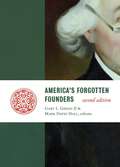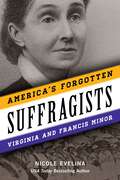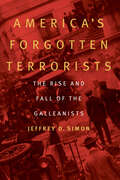- Table View
- List View
America's Encounters with Southeast Asia, 1800-1900: Before the Pivot (Asian History)
by Farish A. NoorA century before the Philippines came under American control, Americans were already travelling to Southeast Asia regularly. This book looks at the writings of American diplomats, adventurers, and scientists and chronicles how nineteenth-century Americans viewed and imagined Southeast Asia through their own cultural-political lenses. It argues that as Americans came to visit the region they also brought with them a train of cultural assumptions and biases that contributed to the development of American Orientalism in Southeast Asia.
America's Ethan Allen
by Stewart H. HolbrookThis book presents the life and legends of Colonel Ethan Allen and Green Mountain boys of the American Revolution.
America's Failing Economy and the Rise of Ronald Reagan
by Eric R. CrouseThis book examines one of the most important economic outcomes in American history—the breakdown of the Keynesian Revolution. Drawing on economic literature, the memoirs of economists and politicians, and the popular press, Eric Crouse examines how economic decline in the 1970s precipitated a political revolution. Keynesian thought flourished through the presidencies of Lyndon B. Johnson, Richard Nixon, and Gerald Ford, until stagflation devastated American workers and Jimmy Carter’s economic policies faltered, setting the stage for the 1980 presidential campaign. Tracking years of shifting public opinion and colorful debate between free-market and Keynesian economists, this book illuminates a neglected era of American economic history and shows how Ronald Reagan harnessed a vision of small government and personal freedom that transformed the American political landscape.
America's Fatal Leap: 1991-2016
by Paul W. SchroederA decisive analytic critique of US foreign policy by one of America&’s greatest historiansAmerica's Fatal Leap deconstructs US geopolitics after the end of the Cold War, informed by its author's unsurpassed command of modern history. Paul W. Schroeder, an acclaimed historian of international diplomacy, was a conservative and a natural supporter of American leadership in the world.But he wrote scathing op-eds for the National Interest and the American Conservative about the hubris and moral failings of the War on Terror, warning of damaging long-range effects on the international system. Schroeder compared 9/11 to the assassination in Sarajevo that sparked the First World War, insisting that a great power should never give terrorists a war they wanted.He wrote with extraordinary prescience - months before the US launched its attack on the Taliban - of the 'risks of victory' in Afghanistan, characterised the war in Iraq as a failed bid for informal empire, and called for 'disimperialism' in the Middle East.America's Fatal Leap collects Schroeder's remarkable interventions on America's adventurism in the Middle East, from the 1991 Gulf War to the Surge of 2007. It includes an Introduction by Perry Anderson, author of US Foreign Policy and Its Thinkers and Ever Closer Union?
America's Favorite Holidays
by Bruce David ForbesAmerica's Favorite Holidays explores how five of America's culturally important holidays--Christmas, Valentine's Day, Easter, Halloween, and Thanksgiving--came to be what they are today, seasonal and religious celebrations heavily influenced by modern popular culture. Deftly distilling information from a wide range of sources, Bruce David Forbes reveals often-surprising answers to questions about each holiday's traditions. Was Christmas always as commercialized as it is today? Is Thanksgiving a religious or secular holiday? When did we begin trick-or-treating on Halloween? Appealing and insightful, America's Favorite Holidays satisfies our curiosity about the origins of our holidays and the fascinating ways in which religion and culture mix.
America's Femme Fatale: The Story of Serial Killer Belle Gunness
by Jane Simon AmmesonHow does a Norwegian farm girl become an infamous American serial killer, responsible for upward of 40 murders? Born in rural Norway in 1859, "Belle" Storset Sorenson Gunness was constantly dealt bad hands in life—so she decided to take life into her own hands. In America's Femme Fatale: The Story of Serial Killer Belle Gunness, Jane Simon Ammeson traces Gunness's path from a poor teenager rejected by a wealthy lover; to a new wife in Chicago, desperate to escape the poverty of her childhood and impatient for a child to love; to an ambitious, widowed landowner in La Porte, Indiana. Ammeson's careful research reveals how the young immigrant slowly turned into one of America's most dangerous serial killers, allegedly murdering husbands, lovers, and children, and, for a price, disposing of inconvenient corpses for others. Ammeson brings this shocking story to life, detailing the suspicious neighbors who were cowed into silence by Belle's intimidating personality, the culture of orphanages trafficking children and matrimonial agencies, the carnival atmosphere that exploded around the pile of bones found on Gunness's farm, and the sensational reporting that filled newspapers for months.Perfect for true crime fans fascinated by the creation of a sociopathic serial killer, America's Femme Fatale will leave you entertained and looking over your shoulder.
America's First Ally: France in the Revolutionary War (The Pocket Manual Series)
by Norman Desmarais<p>The Revolutionary War historian provides “a comprehensive and accessible guide” to the vital influence France had on America’s path to independence (Publishers Weekly).<p> <p>French support for United States independence was both vital and varied, ranging from ideological inspiration to financial and military support. In this study, historian Norman Desmarais offers an in-depth analysis of this crucial relationship, exploring whether America could have won its independence without its first ally.<p> <p>Demarais begins with the contributions of French Enlightenment thinkers who provided the intellectual frameworks for the American and French revolutions. He then covers the many forms of aid provided by France during the Revolutionary War, including the contributions of individual French officers and troops, as well as covert aid provided before the war began. France also provided naval assistance, particularly to the American privateers who harassed British shipping. Detailed accounts drawn from ships’ logs, court and auction records, newspapers, letters, diaries, journals, and pension applications.<p> <p>In a more sweeping analysis, Desmarais explores the international nature of a war which some consider the first world war. When France and Spain entered the conflict, they fought the Crown forces in their respective areas of economic interest. In addition to the engagements in the Atlantic Ocean, along the American and European coasts and in the West Indies, there are accounts of action in India and the East Indies, South America and Africa.<p>
America's First Black Socialist: The Radical Life of Peter H. Clark
by Nikki M. TaylorThis authoritative biography chronicles the pioneering work of a nineteenth-century Black abolitionist and civil rights activist.Growing up in the free state of Ohio before the Civil War, Peter H. Clark dedicated himself to the abolitionist cause. In pursuit of equal citizenship for African Americans, Clark was at various times a loyal supporter of the Republican Party, and an advocate for the Democrats, and the country's first black socialist. Clark led the fight for African Americans' access to Ohio's public schools and became the first black principal in the state.America's First Black Socialist draws upon speeches, correspondence, and outside commentary to provide a balanced account of this influential yet neglected figure. Charting Clark's changing allegiances and ideologies from the antebellum era through the 1920s, this comprehensive biography illuminates the life and legacy of an important activist while also highlighting the black radical tradition that helped democratize America.
America's First Clash with Iran: The Tanker War, 1987–88
by Lee Allen ZatarainA revealing account of the US conflict with Iran over the Persian Gulf during the Reagan era—and the groundwork it set for today&’s tensions. In May 1987, the US frigate Stark was blown apart by an Iraqi jet fighter in the Persian Gulf, jumpstarting a major conflict with Iran that came to be known as the Tanker War. In America&’s First Clash with Iran, author Lee Allen Zatarain employs Pentagon documents and firsthand interviews to reveal the full story of a conflict that may have presaged further battles to come. At the climax of the Iran-Iraq War, Iran was losing on the battlefield. Ayatollah Khomeini decided to close the Persian Gulf against shipping from Iraq&’s oil-rich backer, the emirate of Kuwait. When the United States sent a fleet to the Gulf, raising the Stars and Stripes over Kuwait&’s commercial tankers, a tinderbox was set off. The Iranians laid mines throughout the narrow passage and launched attack boats against both tankers and US warships. The US Navy fought its largest surface battle since World War II against the Ayatollah&’s assault boats. As Saddam Hussein looked on, Iranian gunners fired missiles against US forces—actions which, if made known at the time, would have required the US Congress to declare war against Iran.
America's First Crisis: The War of 1812 (Excelsior Editions)
by Robert P. WatsonGold Medalist, 2015 Independent Publisher Book Awards in the U.S. History CategoryThe War of 1812, sometimes called "America's forgotten war," was a curious affair. At the time, it was dismissed as "Mr. Madison's War." Later it was hailed by some as America's "Second War for Independence" and ridiculed by others, such as President Harry Truman, as "the silliest damned war we ever had." The conflict, which produced several great heroes and future presidents, was all this and more.In America's First Crisis Robert P. Watson tells the stories of the most intriguing battles and leaders and shares the most important blunders and victories of the war. What started out as an effort to invade Canada, fueled by anger over the harassment of American merchant ships by the Royal Navy, soon turned into an all-out effort to fend off an invasion by Britain. Armies marched across the Canadian border and sacked villages; navies battled on Lake Ontario, Lake Champlain, and the world's oceans; both the American and Canadian capitals were burned; and, in a final irony, the United States won its greatest victory in New Orleans—after the peace treaty had been signed.
America's First Daughter
by Stephanie Dray Laura KamoieIn a compelling, richly researched novel that draws from thousands of letters and original sources, bestselling authors Stephanie Dray and Laura Kamoie tell the fascinating, untold story of Thomas Jefferson's eldest daughter, Martha "Patsy" Jefferson Randolph--a woman who kept the secrets of our most enigmatic founding father and shaped an American legacy.<P><P> From her earliest days, Patsy Jefferson knows that though her father loves his family dearly, his devotion to his country runs deeper still. As Thomas Jefferson's oldest daughter, she becomes his helpmate, protector, and constant companion in the wake of her mother's death, traveling with him when he becomes American minister to France.<P> It is in Paris, at the glittering court and among the first tumultuous days of revolution, that fifteen-year-old Patsy learns about her father's troubling liaison with Sally Hemings, a slave girl her own age. Meanwhile, Patsy has fallen in love--with her father's protégé William Short, a staunch abolitionist and ambitious diplomat. Torn between love, principles, and the bonds of family, Patsy questions whether she can choose a life as William's wife and still be a devoted daughter.<P> Her choice will follow her in the years to come, to Virginia farmland, Monticello, and even the White House. And as scandal, tragedy, and poverty threaten her family, Patsy must decide how much she will sacrifice to protect her father's reputation, in the process defining not just his political legacy, but that of the nation he founded. <P><b>A New York Times Bestseller</b>
America's First Diplomat
by Barbara Brooks SimonsDo you know who Benjamin Franklin is? You might know him as the scientist who discovered electricity by tying a key to a kite during a storm! Did you know he was a founding father of the United States? He made many efforts to the Revolutionary War and the construction of the United States government. Learn about all the political contributions he made that helped create the United States!
America's First Dynasty: The Adamses, 1735-1918
by Richard BrookhiserRichard Brookhiser has won a wide and loyal following for his stylish, pointed, and elegant biographies of George Washington and Alexander Hamilton. In America's First Dynasty,Brookhiser tells the story of America's longest and still greatest dynasty- the Adamses, the only family in our history to play a leading role in American affairs for nearly two centuries. From John, the self-made, tough-minded lawyer who rose to the highest office in the government he helped create; to John Quincy, the child prodigy who grew up amid foreign royalty, followed his father to the White House, and later reinvented himself as a champion of liberty in Congress; to politician and writer Charles Francis, the only well-balanced Adams; to Henry, brilliant scholar and journalist- the Adamses achieved longer-lasting greatness than any other American family. Brookhiser's canvass starts in colonial America, when John Adams had to teach himself the law and ride on horseback for miles to find clients. It does not end until after the Titanic sinks- Henry had booked a room but changed his plans- and World War I begins, with Henry near the action in France. The story of this single family offers a short course in the nation's history, because for nearly two hundred years Adams history was American history. The Adamses were accompanied by an impressive cast of characters, from George Washington and Thomas Jefferson, to Andrew Jackson and Ulysses Grant, to Teddy Roosevelt. America's First Dynasty offers telling portraits of the great men of our past, and many of the women around them. John and Abigail's great love affair was destined to be repeated by their offspring and offspring's offspring. As with any family, there was a darker side to the Adams story: many of its members were abject failures. Alcoholism was a familiar specter, and suicide was not unknown. Only one of the four great Adamses was a kind man and father; the others set standards so impossibly high that few of their children could meet them. Yet despite more than a century of difference from John to Henry, certain Adams traits remained the same. In the story of our first and still-greatest family, we can all see something of our own struggles with family, fate, and history.
America's First Freedom Rider: Elizabeth Jennings, Chester A. Arthur, and the Early Fight for Civil Rights
by Jerry MikorendaIn 1854, traveling was full of danger. Omnibus accidents were commonplace. Pedestrians were regularly attacked by the Five Points&’ gangs. Rival police forces watched and argued over who should help. Pickpockets, drunks and kidnappers were all part of the daily street scene in old New York. Yet somehow, they endured and transformed a trading post into the Empire City. None of this was on Elizabeth Jennings&’s mind as she climbed the platform onto the Chatham Street horsecar. But her destination and that of the country took a sudden turn when the conductor told her to wait for the next car because it had &“her people&” in it. When she refused to step off the bus, she was assaulted by the conductor who was aided by a NY police officer. On February 22, 1855, Elizabeth Jennings v. Third Avenue Rail Road case was settled. Seeking $500 in damages, the jury stunned the courtroom with a $250 verdict in Lizzie&’s favor. Future US president Chester A. Arthur was Jennings attorney and their lives would be forever onward intertwined. This is the story of what happened that day. It&’s also the story of Jennings and Arthur&’s families, the struggle for equality, and race relations. It&’s the history of America at its most despicable and most exhilarating. Yet few historians know of Elizabeth Jennings or the impact she had on desegregating public transit.
America's First Frogman
by Elizabeth Kauffman BushAlthough bad eyesight kept him from receiving a commission in the U.S. Navy when he graduated from the Naval Academy in 1933, Draper Kauffman became a hero of underwater demolition in World War II and went on to a distinguished naval career. Today Admiral Kauffman is remembered as the nation's first frogman and the father of the Navy Seals. His spectacular wartime service disarming enemy bombs, establishing bomb disposal schools, and organizing and leading the Navy's first demolition units is the focus of this biography written by Kauffman's sister. Elizabeth Kauffman Bush, who also is the aunt of President George W. Bush, draws on family papers as well as Navy documents to tell Kauffman's story for the first time. Determined to defend the cause of freedom long before the U.S. ever entered the war, Kauffman was taken prisoner by the Germans as an ambulance driver in France, and after his release joined the Royal Navy to defuse delayed-action bombs during the London blitz. After Pearl Harbor his eyes were deemed adequate and he was given a commission in the U.S. Naval Reserve. With his experience, he was asked to establish an underwater demolition school in Fort Pierce, Florida, where he personally trained men to defuse bombs and neutralize other submerged dangers. His men were sent to demolish the obstacles installed by the Nazis at Normandy, and Kauffman himself led underwater demolition teams in the Pacific at Saipan, Tinian, and Guam and later directed UDT operations at Iwo Jima and Okinawa. His men remember him as an exceptional leader who led by example. He trained and fought alongside them, impervious to danger. Because of the high standards he set for those who became "frogmen,"thousands of American lives were saved in World War II, Korea, and Vietnam. Draper Kauffman's early established UDT traditions of perseverance, teamwork, and a lasting brotherhood of men of extraordinary courage is carried on by Navy Seals. This is his legacy to the U.S. Navy and his country.
America's First Great Depression: Economic Crisis and Political Disorder after the Panic of 1837
by Alasdair RobertsFor a while, it seemed impossible to lose money on real estate. But then the bubble burst. The financial sector was paralyzed and the economy contracted. State and federal governments struggled to pay their domestic and foreign creditors. Washington was incapable of decisive action. The country seethed with political and social unrest. In The First Great Depression, Alasdair Roberts describes how the United States dealt with the economic and political crisis that followed the Panic of 1837. As Roberts shows, the two decades that preceded the Panic had marked a democratic surge in the United States. However, the nation's commitment to democracy was tested severely during this crisis. Foreign lenders questioned whether American politicians could make the unpopular decisions needed on spending and taxing. State and local officials struggled to put down riots and rebellion. A few wondered whether this was the end of America's democratic experiment. Roberts explains how the country's woes were complicated by its dependence on foreign trade and investment, particularly with Britain. Aware of the contemporary relevance of this story, Roberts examines how the country responded to the political and cultural aftershocks of 1837, transforming its political institutions to strike a new balance between liberty and social order, and uneasily coming to terms with its place in the global economy.
America's First Ladies: Their Uncommon Wisdom, from Martha Washington to Laura Bush
by Bill AdlerHere are the personal philosophies, opinions, thoughts, witticisms, and feelings of such upstanding and quintessential Americans as Abigail Adams, Dolly Madison, Eleanor Roosevelt, Jacqueline Kennedy, Nancy Reagan, Barbara Bush, and Hillary Clinton. These women have been more than just wives of American Presidents. Their roles have included everything from negotiating with heads of state to redecorating the White House, from debating political issues to acting as advisors, confidantes, and diplomats.Through statements made during press interviews and in speeches and in writing, these women put into words what might otherwise have remained private: Abigail Adams proves herself to be a pioneer feminist; Eleanor Roosevelt defines life's ultimate success; Lady Bird Johnson recounts a soul-enriching boat ride; and much more. What they have to say about marriage, child-rearing, success, happiness, beauty in the world, education, careers for women, women in politics, relationships, growing old, love, and living life to the fullest is powerful and profound.The pronouncements, pet peeves, gibes, and joys revealed in America's First Ladies add texture to the more secretive administrations, and color to the sterner and more stoic ones.
America's First Regional Theatre
by Jeffrey UllomThe Cleveland Play House has mirrored the achievements and struggles of both the city of Cleveland and the American theatre over the past one hundred years. This book challenges the established history (often put forward by the theatre itself) and long-held assumptions concerning the creation of the institution and its legacy.
America's First Woman Lawyer: The Biography of Myra Bradwell
by Jane M. FriedmanDuring her lifetime, Myra Bradwell (1831-1894) - America's "first" woman lawyer as well as publisher and editor-in-chief of a prestigious legal newspaper - did more to establish and aid the rights of women and other legally handicapped people than any other woman of her day. Her female contemporaries - Susan B. Anthony, Elizabeth Cady Stanton, Lucy Stone - are known to all. Now it is time for Myra Bradwell to assume her rightful place among women's rights leaders of the nineteenth century. With author Jane Friedman's discovery of previously unpublished letters and valuable documents, Bradwell's fascinating story can at last be told.
America's Fiscal Constitution: Its Triumph and Collapse
by Bill WhiteWhat would Washington, Jefferson, Madison, Lincoln, the Roosevelts, Truman, and Eisenhower have done about today's federal debt crisis?America's Fiscal Constitution tells the remarkable story of fiscal heroes who imposed clear limits on the use of federal debt, limits that for two centuries were part of an unwritten constitution. Those national leaders borrowed only for extraordinary purposes and relied on well-defined budget practices to balance federal spending and revenues. That traditional fiscal constitution collapsed in 2001. Afterward-for the first time in history-federal elected officials cut taxes during war, funded permanent new programs entirely with debt, grew dependent on foreign creditors, and claimed that the economy could not thrive without routine federal borrowing.For most of the nation's history, conservatives fought to restrain the growth of government by insisting that new programs be paid for with taxation, while progressives sought to preserve opportunities for people on the way up by balancing budgets. Virtually all mainstream politicians recognized that excessive debt could jeopardize private investment and national independence.With original scholarship and the benefit of experience in finance and public service, Bill White dispels common budget myths and distills practical lessons from the nation's five previous spikes in debt. America's Fiscal Constitution offers an objective and hopeful guide for people trying to make sense of the nation's current, most severe, debt crisis and its impact on their lives and our future.
America's Flag Story
by Karen S. RobbinsThe American flag waves in reverence for many—for the immigrants who came and built a nation with hard work and ingenuity and for all who continue to defend and serve our nation. The verse and artwork resonate with the symbolism that represents the very characteristics of our nation and offers young readers a clear understanding of how one part of our country says so much. The flag represents the freedom, the endurance, and the indomitable courage that makes America the home of the free and brave.
America's Forgotten Colonial History
by Dana HuntleyThis is what we all learned in school: Pilgrims on the Mayflower landed at Plymouth Rock in 1620. They had a rough start, but ultimately made a go of it, made friends with the Indians, and celebrated with a big Thanksgiving dinner. Other uptight religious Puritans followed them and the whole place became New England. There were some Dutch down in New York, and sooner or later William Penn and the Quakers came to build the City of Brotherly Love in Pennsylvania, and finally it was 1776 and time to revolt against King George III and become America. That&’s it. That&’s the narrative of American colonial history known to one and all. Yet there are 150 years – six or seven generations between Plymouth Plantation and the 1770s – that are virtually unknown in our national consciousness and unaccounted for in our American narrative. Who, what, when, where and why people were motivated to make a two-month crossing on the North Atlantic to carve a life in a largely uncharted, inhospitable wilderness? How and why did they build the varied societies that they did here in the New World colonies? How and why did we become America?America&’s Forgotten Colonial History tells that story.
America's Forgotten Founders, second edition (Lives of the Founders)
by Mark David Hall Gary L. GreggBeyond Washington and Jefferson: Ranking the Founders. Even as Americans devour books about our Founding Fathers, the focus seldom extends past a half dozen or so icons—Franklin, Washington, Adams, Jefferson, Madison, Hamilton. Many of the men (and women) who made prodigious contributions to the American founding have been all but forgotten. America's Forgotten Founders corrects this injustice. Editors Gary L. Gregg II and Mark David Hall surveyed forty-five top scholars in history, political science, and law to produce the first-ever ranking of the most neglected contributors to the American Revolution and our constitutional order. This unique book features engaging short biographies of the top ten most important Founders whose contributions are overlooked today: James Wilson, George Mason, Gouverneur Morris, John Jay, Roger Sherman, John Marshall, John Dickinson, Thomas Paine, Patrick Henry, and John Witherspoon. Part of the "Lives of the Founders" series, America's Forgotten Founders reshapes our understanding of America's founding generation.
America's Forgotten Suffragists: Virginia and Francis Minor
by Nicole EvelinaAfter being forgotten for nearly 130 years, the &“Mother of Suffrage in Missouri&” and her husband are finally taking their rightful place in history.St. Louisans Virginia and Francis Minor forever changed the direction of women&’s rights by taking the issue to the Supreme Court for the first and only time in 1875, a feat never eclipsed even by their better-known peers Susan B. Anthony and Elizabeth Cady Stanton. Yet despite a myriad of accomplishments and gaining notoriety in their own time, the Minors&’ names have largely faded from memory. In 1867, Virginia founded the nation&’s first organization solely dedicated to women&’s suffrage—two years before Anthony formed the National Woman&’s Suffrage Association (NWSA). Virginia and Francis were also the brains behind the groundbreaking idea that women were given the right to vote under the Fourteenth Amendment, a philosophy the NWSA adopted for nearly a decade.And their story doesn&’t end there. After the court case, Francis went on to become a prolific writer on women&’s rights and one of the first and strongest male allies of the suffrage movement. Virginia instigated tax revolts across the country and campaigned side-by-side with Anthony for women&’s rights in Missouri, Kansas, and Nebraska. America&’s Forgotten Suffragists: Virginia and Francis Minor is the first biography of these suffrage celebrities who were unique for their time in being jointly dedicated to the cause of female enfranchisement. This book follows their lives from slave-holding Virginians through their highly-lauded civilian work during the Civil War, and into the height of the early suffrage movement to show how two ordinary people of like mind, dedicated to a cause, can change the course of history.
America's Forgotten Terrorists: The Rise and Fall of the Galleanists
by Jeffrey D. SimonThough largely forgotten today, one of the most destructive terrorist groups in the United States was the Galleanists, a fiery band of Italian anarchists active during the early 1900s. In America&’s Forgotten Terrorists, Jeffrey D. Simon shows how alienation and frustration among segments of a community were transformed into a militant extremist movement. Luigi Galleani, a gifted writer and speaker, tapped into widespread disappointment among Italian immigrants concerning their lives in America. Unemployment, low wages, long working hours, discrimination, and a poor quality of life made many Italian immigrants receptive to his words. The Galleanists introduced terrorist tactics and strategies that are still used today: they were the first group to send package bombs across the country and to exploit the media for their own advantage. One of their members is also suspected of launching the first vehicle bomb in the United States in 1920, considered the worst act of domestic terrorism until the 1995 Oklahoma City bombing. The story of the Galleanists is a chilling journey through a volatile period in American history, including labor-management conflicts, World War I, and the Red Scare. An expert in terrorism, Simon offers striking insights into the Galleanist era and some of its eerie connections to modern America, calling us to recognize the risks of repeating our history. How the Galleanists operated and how the U.S. government responded hold lessons for today as we continue to deal with the threat of terrorism.
